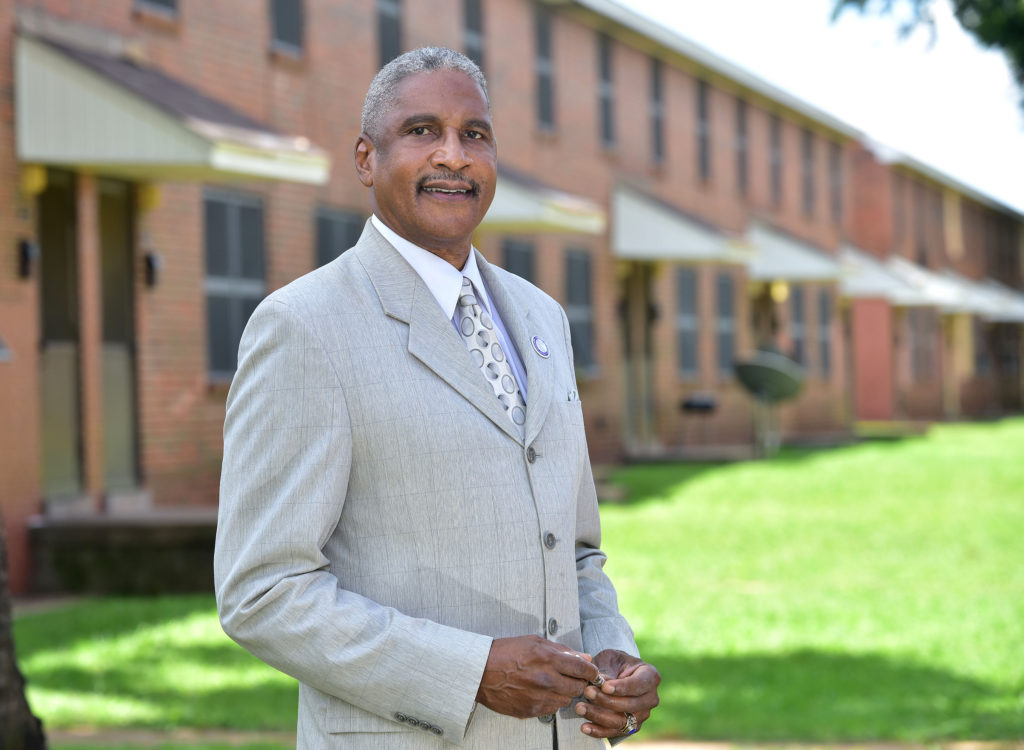By Joseph D. Bryant
Housing Authority of the Birmingham District
Thousands of residents in Birmingham public housing will soon get numerous resources to help put them on the path to self-sufficiency, officials announced on Wednesday.
Crews with the Housing Authority of the Birmingham District are already transforming the Marks Village Community Center into a “Campus of Hope.”
The initiative is to transform the traditional community center into an opportunity center — a hub of social service and opportunity agencies at one location where individuals and families will have the opportunity to access resources designed to put them on a path of financial and social awareness, and self-sufficiency.
“We are committed to breaking the cycle of generational poverty and generational dependency on public housing as we know it,” said HABD President/CEO Michael Lundy. “The Campus of Hope has the ability to bring the transformative change that we all seek for Marks Village, Gate City and east Birmingham.”
The Campus of Hope, while based at Marks Village, will also serve residents of nearby Tom Brown Village, Harris Homes and Morton Simpson Village. Together, more than 3,300 HABD residents live within the four community service areas.
Additionally, the center will be open to the nearby residents who do not reside in public housing.
It is envisioned that the one-stop shop will eventually grow into a true campus of services model with multiple buildings utilized nearby.
“The center will not only serve the Marks Village and nearby public housing sites, but will also remain open to neighbors in non-housing communities,” Lundy said. “Issues of unemployment, underemployment and public safety do not begin nor end at the gates of public housing, but are shared challenges of the entire community.”
Partners in the transformation include: The U.S. Army, Birmingham City Schools, The UAB Minority Health & Health Disparities Research Center, Lawson State Community College and the Dannon Project.
Logistical planning is underway and services will begin in late March. Physical work includes adding landscaping, making exterior improvements, creating additional room space, and implementing security enhancements to meet the needs for expanded and more diverse use.
HABD is also seeking an endorsement from the Department of Housing and Urban Development (HUD) that could also provide additional resources. HUD Secretary Ben Carson recently announced that the agency would open 10 pilot EnVision Centers across the country. Birmingham is vying for that designation and has recently submitted its request.
“Receiving the EnVision designation is comparable to getting a gold seal for our program,” Lundy said. “Still, the best and most longstanding reward will come in seeing the lives that are enhanced by our partners.”
Other partners in the project include Maranathan Academy, Church of the Highlands and Aletheia House.
Each partnering agency has been specially selected for its record of success in a specific category: economic empowerment, educational advancement, health and wellness and character and leadership. Those four pillars will guide programming and partnerships at the center.
For example Lawson State Community College’s culinary program will provide students with extensive training and development of skills to become competent in food preparation and service.
HABD will renovate the existing top-floor equipped industrial kitchen into a culinary classroom and community café.
“Every element of the Campus of Hope is designed to support the mandate of moving residents to self-sufficiency and realizing the value of self-determination,” Lundy said. “The transformation of individuals and families are just as important as ongoing work to enhance and expand brick and mortar facilities.”
HABD itself will house space for its own Family Self-Sufficiency (FSS) social workers at the site. FSS social workers are already active throughout public housing and assisted housing in Birmingham. Officials said the success of the Campus of Hope will become a model for expansion throughout HABD’s portfolio.
The HABD plan is endorsed by Birmingham Mayor Randall Woodfin and Councilmembers Darryl O’Quinn and William Parker, who represent the planned service area.
HABD’s initiative fully aligns with Mayor Woodfin’s recently declared “Opportunity Agenda” to fully leverage City Hall’s resources to elevate the city’s most vulnerable residents. According to Woodfin, more than $1 billion was invested in Birmingham’s regional economy in 2015, yet that prosperity remains invisible in many of the city’s struggling neighborhoods. Part of his remedy includes creating neighborhood “opportunity centers.”
Mirroring the Campus of Hope, Mayor Woodfin’s plan includes developing partnerships with area workforce development providers and adult education providers among others to bring resources that will connect Birmingham residents to job training, adult education and local employment opportunities.
“The cycle of poverty and financial dependency is positioned to continue unless families receive the tools needed to reach higher educational benchmarks that prepare them for better job opportunities,” Lundy said. “We have a shared obligation to make sure these tools are available to all of our neighbors.”




